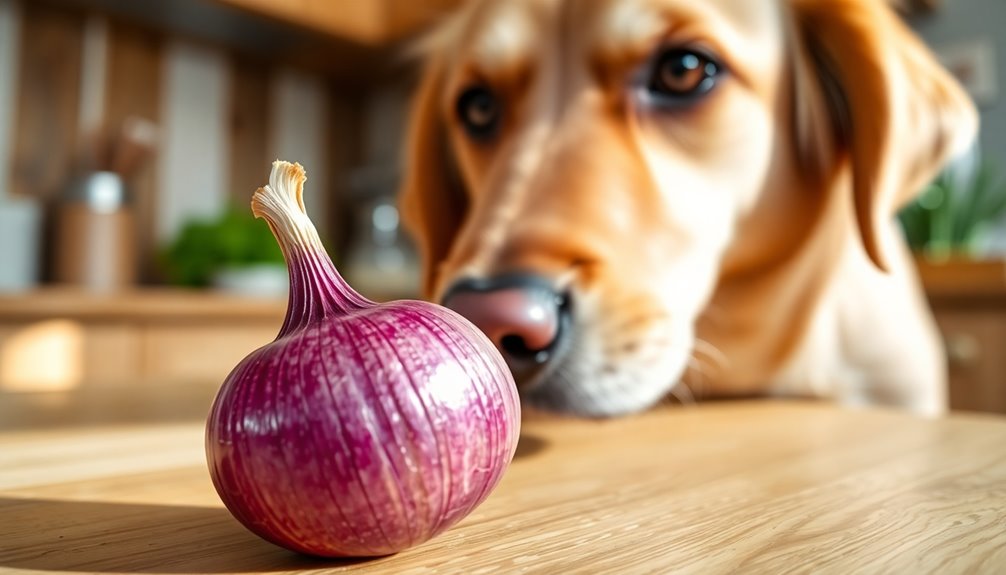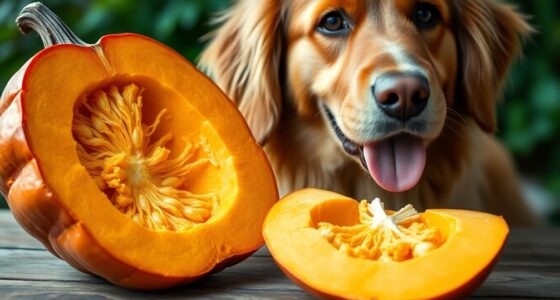Yes, a small amount of onion can hurt your dog. Even just 0.1 oz of raw onion for a 10-pound dog can be toxic. Onions contain harmful substances that can lead to serious conditions like hemolytic anemia, which breaks down red blood cells. You'll want to be vigilant for symptoms like vomiting, lethargy, or pale gums. If you suspect your dog has eaten onion, it's essential to consult a veterinarian promptly. Quick action can greatly improve recovery chances. To keep your pup safe, it's important to understand more about onion toxicity and prevention strategies.
Key Takeaways
- Even small amounts of onion can be toxic to dogs, potentially causing hemolytic anemia.
- Symptoms of onion toxicity include vomiting, diarrhea, lethargy, and pale gums.
- Immediate veterinary consultation is crucial if you suspect your dog has ingested onion.
- Treatment may involve inducing vomiting and providing supportive care, with severe cases requiring blood transfusions.
- Prevention includes securing onion-containing foods and educating others about dog-safe foods.
Understanding Onion Toxicity
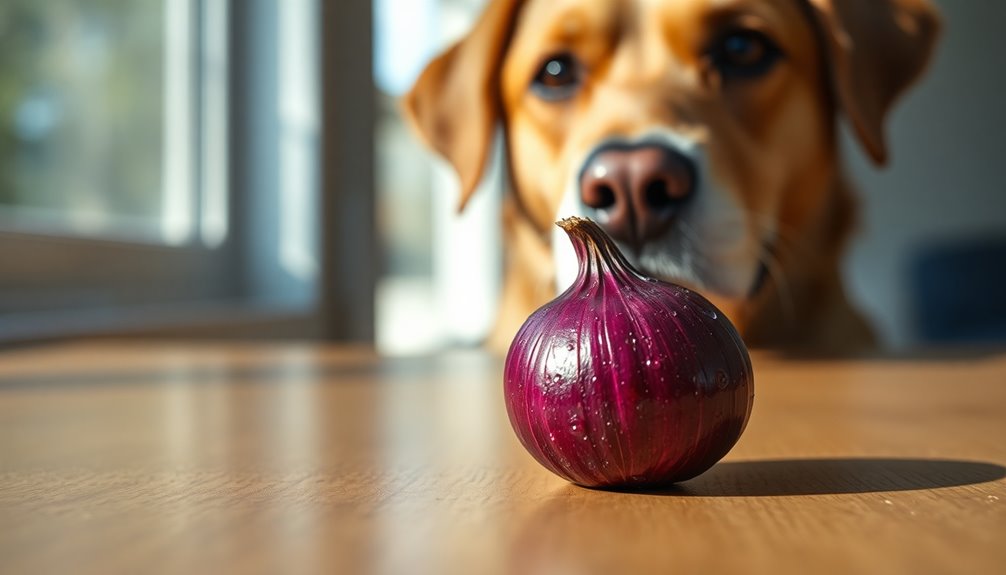
When it comes to understanding onion toxicity, it's vital to know just how dangerous onions can be for dogs.
Onions contain N-propyl disulfide and thiosulfate, which are toxic and can lead to the breakdown of red blood cells, resulting in anemia. Dogs are particularly susceptible; even a small amount, like 0.1 oz of raw onion for a 10-pound dog, can cause severe harm.
All parts of the onion plant, including the flesh and juice, are toxic and should be strictly avoided. If your dog ingests onions, you must seek immediate veterinary consultation, as symptoms can escalate quickly.
Awareness of onion toxicity is important for keeping your furry friend safe and healthy. Remember, prevention is key!
Symptoms of Onion Poisoning
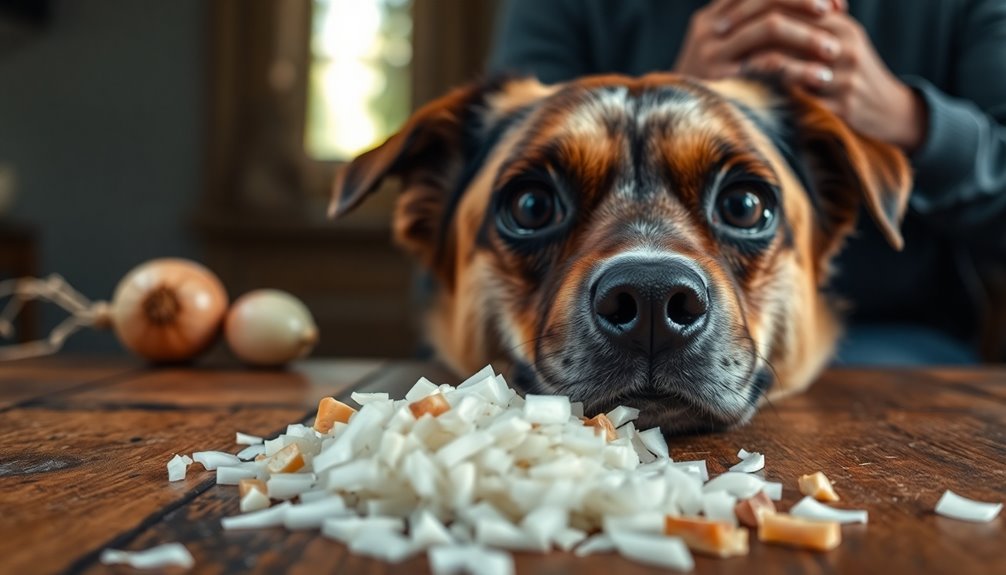
If your dog has ingested onions, it's important to be aware of the symptoms that may arise.
Common signs of onion poisoning include vomiting, diarrhea, lethargy, and decreased appetite. You might also notice your dog showing symptoms of hemolytic anemia, such as pale gums, weakness, and even reddish urine due to the breakdown of red blood cells.
Symptoms can show up within hours or even days after ingestion, so monitoring your pet closely is significant. Severe cases may lead to an elevated heart rate and panting, which require immediate attention.
Early recognition of these symptoms and prompt veterinary care are crucial for effective treatment and recovery from onion poisoning. Stay vigilant to keep your furry friend safe.
Emergency Response Steps
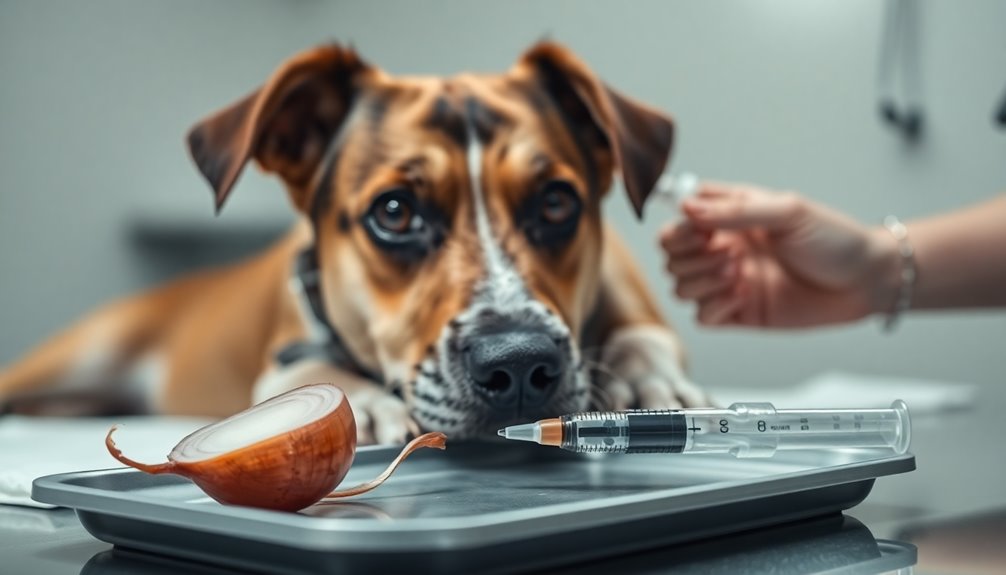
Recognizing the symptoms of onion poisoning is just the first step; knowing how to respond is equally important. If you suspect your dog has ingested onions, contact your veterinarian immediately, even if no symptoms are present.
Monitor your dog closely for signs of onion toxicity, including vomiting, diarrhea, lethargy, and difficulty breathing. Quick action is essential, as even small amounts can be harmful.
If ingestion occurred within two hours, your veterinarian may suggest inducing vomiting, but don't attempt this without their guidance. Document the type and amount of onion consumed, along with the time of ingestion, to provide precise information.
Immediate Actions After Ingestion
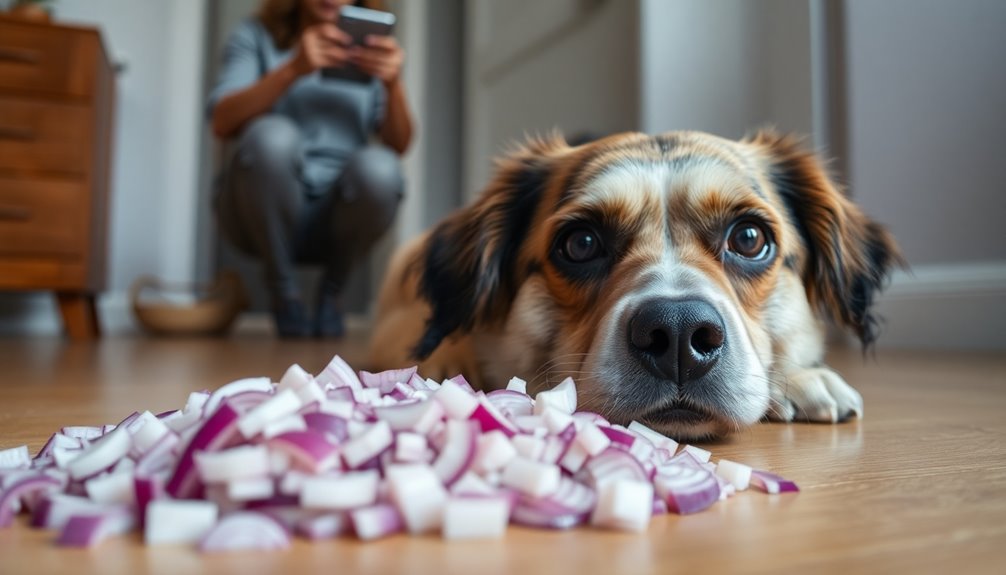
After your dog ingests onions, swift action is essential to minimize potential harm. First, monitor for symptoms like vomiting, diarrhea, or lethargy, which can appear hours after ingestion. Assess the amount of onion consumed based on your dog's weight, as even a small amount of onion can pose health risks. Contact your veterinarian immediately if symptoms develop.
| Dog Weight | Small Amount of Onion | Symptoms to Monitor |
|---|---|---|
| 10 lbs | 0.1 oz | Vomiting |
| 20 lbs | 0.2 oz | Diarrhea |
| 30 lbs | 0.3 oz | Lethargy |
If no symptoms are present and the ingestion was minor, your vet may recommend close monitoring instead of inducing vomiting.
Veterinary Diagnosis and Treatment
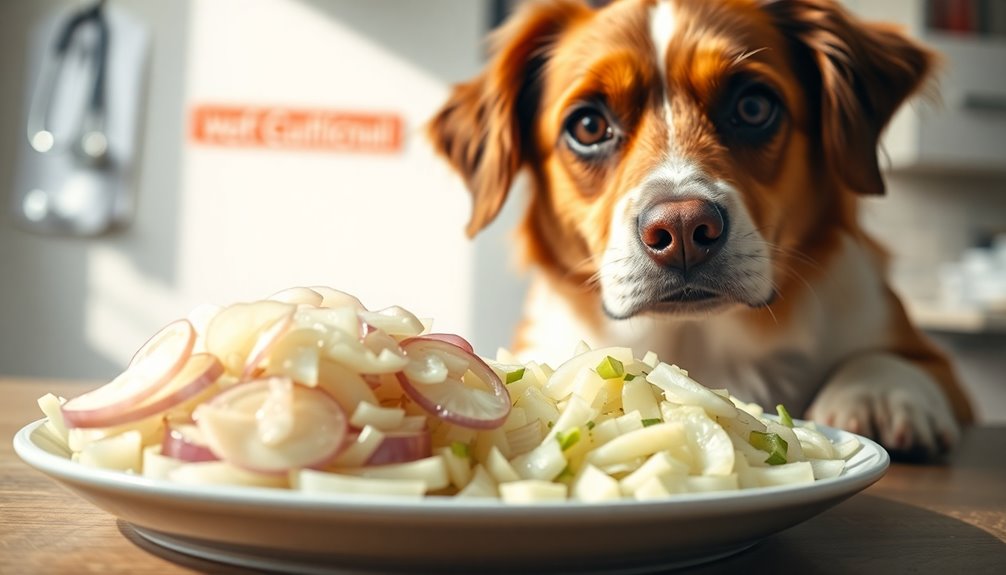
Prompt veterinary diagnosis and treatment are essential when it comes to onion toxicity in dogs. If you suspect your dog has consumed onions, look for symptoms like lethargy, vomiting, and pale gums, and seek immediate veterinary intervention.
A thorough veterinary diagnosis typically involves a physical examination and blood tests to assess the extent of red blood cell damage. Treatment may include inducing vomiting if the ingestion was recent, followed by supportive care like intravenous fluids to keep your dog hydrated.
In severe cases of onion toxicity, blood transfusions may be necessary to restore healthy red blood cell levels and manage hemolytic anemia effectively. Acting quickly can greatly improve your dog's recovery outcomes, so don't delay in getting help.
Prevention Strategies for Dog Owners
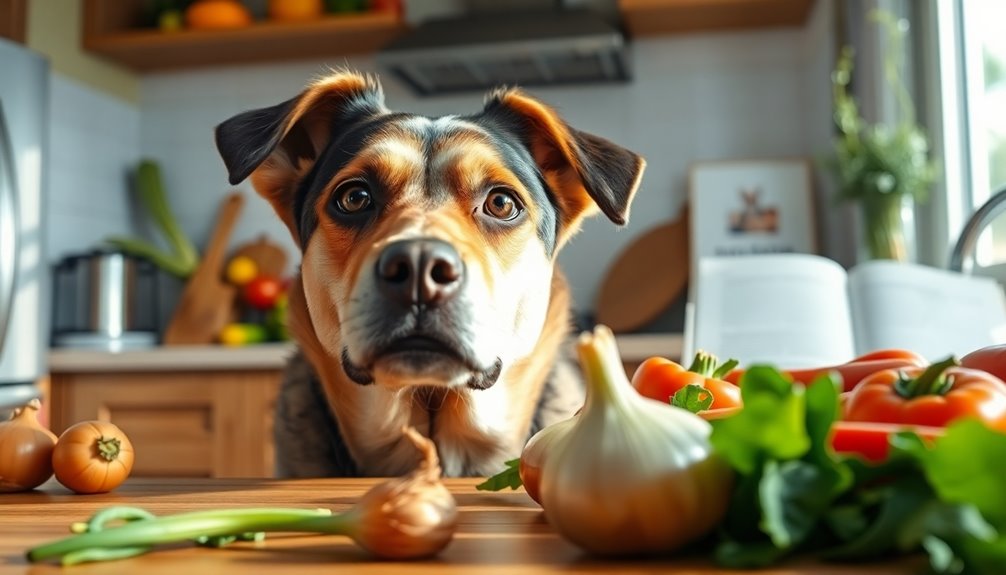
To keep your dog safe from onion toxicity, it's crucial to implement effective prevention strategies in your home. Start by preventing accidental ingestion of toxic foods like onions.
- Secure all food items, especially those containing onions, in cabinets or containers out of reach.
- Regularly check ingredient labels on human food and pet treats to avoid harmful ingredients.
- Educate family members and guests about what's safe for dogs, emphasizing the dangers of the allium family.
Additionally, use dog-safe seasonings, like parsley, when cooking.
Creating a pet safety checklist that includes onions and other toxic foods will help you stay vigilant. By following these prevention strategies, you'll guarantee a safer environment for your furry friend.
Risks of Different Onion Types
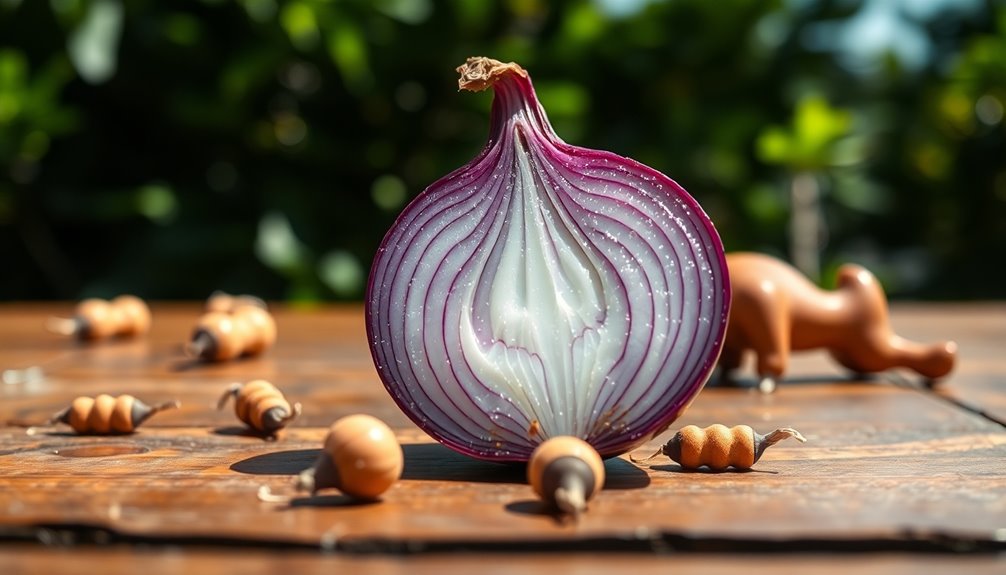
When it comes to onions, not all types are created equal regarding risk for your dog.
Raw onions are particularly toxic due to higher thiosulfate levels, but even cooked and dehydrated onions pose serious dangers.
Understanding these differences can help you keep your furry friend safe from harmful effects.
Raw Onion Risks
Though many dog owners may not realize it, raw onions pose serious risks to your furry friend. Even small amounts of raw onion can be toxic to dogs. The high concentration of N-propyl disulfide in raw onions can lead to oxidative damage to red blood cells, resulting in severe health issues.
Keep an eye out for these symptoms of onion toxicity:
- Vomiting: Your dog may feel nauseous and vomit.
- Lethargy: A noticeable drop in energy levels can occur.
- Anemia: Your dog may develop anemia due to the destruction of red blood cells.
Cooked Onion Dangers
While many believe that cooking onions makes them safe for dogs, this misconception can lead to serious health risks.
Cooked onion dangers are real, as they still contain N-propyl disulfide, the same toxic compound found in raw onions. Even if your small dog ate just 0.1 oz of cooked onion, it could suffer from onion toxicity. The cooking process doesn't eliminate the risk; both forms can cause oxidative damage to red blood cells.
Watch for symptoms of onion, including vomiting and lethargy. If your dog shows any signs, seek immediate help from a veterinarian.
Dehydrated Onion Hazards
Dehydrated onions pose a significant risk to dogs due to their concentrated levels of thiosulfate, which make them even more toxic than fresh onions.
Even small amounts can lead to serious health issues. Be aware of the following risks:
- A mere 0.1 oz of dehydrated onion can harm a 10 lb dog.
- Symptoms of onion toxicity can have a delay, making it essential for dog owners to stay vigilant.
- Ingestion requires immediate attention, as it can lead to hemolytic anemia.
Processed foods often contain dehydrated onions, so always read labels.
Protect your furry friend by avoiding any onion products altogether, as the thiosulfate concentration in dehydrated forms can be particularly harmful to dogs.
Long-term Health Considerations
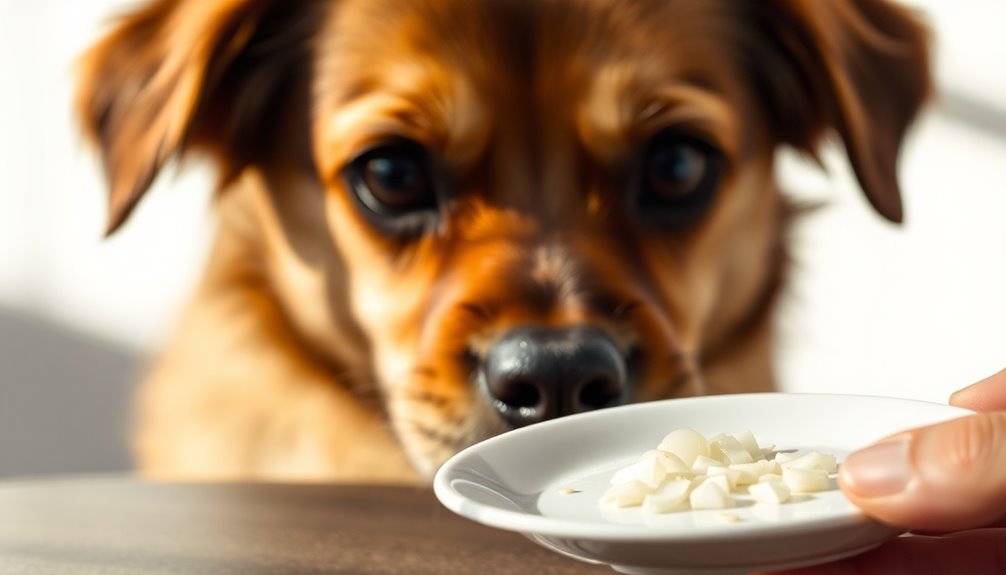
Understanding the long-term health implications of onion exposure is vital for dog owners, as even small amounts can accumulate over time and lead to serious health issues.
Long-term exposure to onions increases the risk of hemolytic anemia in dogs, which can cause considerable health problems. Regular veterinary check-ups are essential to monitor for any delayed effects of onion ingestion, especially if your dog shows no immediate symptoms.
Dogs affected by onion toxicity may need ongoing blood tests to assess red blood cell levels and detect any long-term damage. Maintaining a diet free from onions and educating pet owners about the risks can greatly aid in preventing health issues and ensuring your dog's well-being.
Always prioritize your dog's health.
Resources for Pet Owners
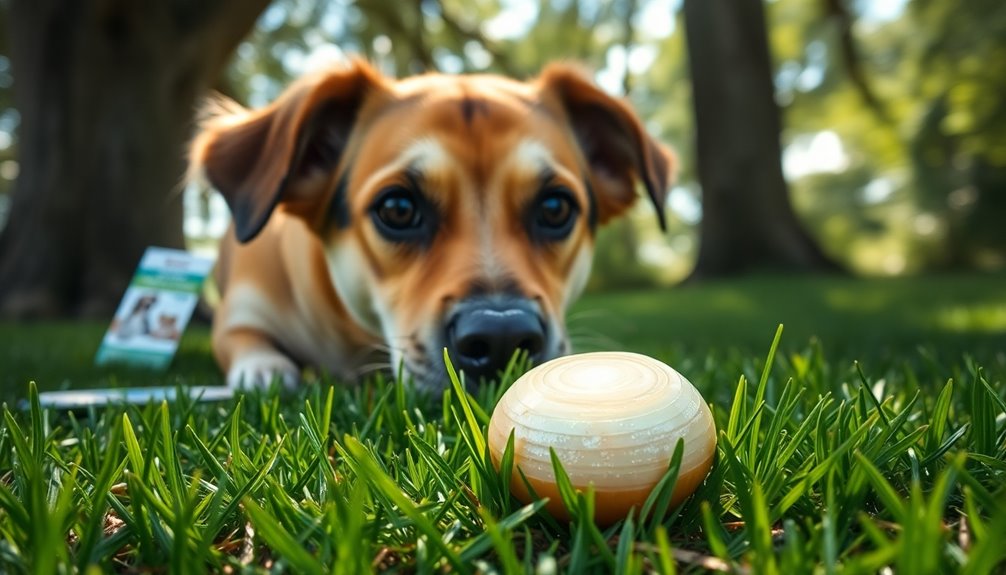
Accessing reliable resources is essential for pet owners who want to keep their dogs safe from hazards like onion toxicity. By educating yourself on the risks associated with certain foods, you can make informed choices for your pet's health.
Consider using these resources:
- Reliable veterinary resources: Find articles and guides on safe and toxic foods.
- Online platforms like JustAnswer: Connect with verified veterinarians for prompt advice on emergencies involving toxic substances.
- Community forums: Share experiences and seek advice from fellow pet owners who faced similar issues.
Don't forget the importance of regular veterinary check-ups to monitor your dog's health and catch potential problems early, especially after ingestion of harmful foods.
Expert Consultation and Support

When your dog ingests onions, it's important to consult a veterinarian right away, as even small amounts can pose serious health risks.
Expert consultation is essential for evaluating onion toxicity and determining the proper course of action. Veterinary professionals can provide immediate guidance on whether to induce vomiting or monitor your dog, depending on the quantity ingested and when it happened.
For urgent inquiries, many veterinarians are available 24/7 through online services like JustAnswer, allowing you to connect with licensed experts quickly.
Keep detailed records of the type and amount of onion consumed, your dog's weight, and any symptoms observed, as this information is critical for your veterinarian to provide the best care for your pet's health.
Frequently Asked Questions
What Happens if a Dog Eats a Tiny Bit of Onion?
If your dog eats a tiny bit of onion, you should keep a close eye on them.
Even small amounts can be harmful, leading to symptoms like vomiting, diarrhea, or lethargy.
Onions damage red blood cells, which can result in serious conditions like hemolytic anemia.
It's essential to monitor for any signs of distress and consult your veterinarian quickly.
Early intervention can make a significant difference in your dog's recovery.
How Quickly Does Onion Affect Dogs?
Let's say your dog snatches up a piece of onion while you're cooking. You might wonder how quickly it'll affect them.
Onions can start impacting dogs within hours, but symptoms often show up 24 hours later. If your pup weighs around 10 pounds and eats just a little, you could notice signs like vomiting or lethargy soon after.
It's vital to keep an eye on them and seek help if you suspect onion ingestion.
How Much Onion Is Toxic to a 50 Lb Dog?
For a 50 lb dog, even a small amount of onion can be harmful.
It takes just 0.1 oz to start affecting them, and around 4 oz can cause serious toxicity.
You should be cautious, as consuming 1 pound in one meal can lead to severe health issues like hemolytic anemia.
Keep an eye out for symptoms like vomiting or lethargy, and remember that both raw and cooked onions are dangerous.
What if My Dog Ate One Onion Chip?
If your dog ate one onion chip, it's important to take it seriously.
Even small amounts can be harmful due to thiosulfate, which can damage red blood cells. You mightn't see immediate symptoms, but keep an eye out for vomiting, lethargy, or pale gums.
Don't hesitate to consult a veterinarian for advice and potential treatment. Quick action can be essential in preventing serious health issues for your furry friend.
Conclusion
In the garden of pet care, knowledge is your best fertilizer. A small amount of onion might seem like a harmless snack, but it can turn into a ticking time bomb for your furry friend. Stay vigilant and keep those onions out of reach, nurturing your dog's health like a precious seed. If you suspect your pup's had a taste, don't hesitate—act quickly and consult a vet. Your dog's well-being is worth every ounce of caution.

